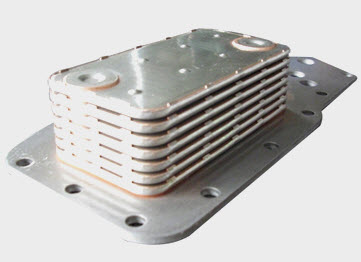
If you use the wrong type of oil in your engine or your oil is simply old and has accumulated a lot of debris and dirt then it will start to burn. All diesel engines burn oil They do whether you realize it or not.

To keep these pistons cool theyre still moving up and down in the cylinder so they need cooling and lubrication the AFM system sprays oil onto the pistons via a special oil pressure relief valve.
Diesel engine burning oil. Oil Consumption Into Combustion Area The most frequent place to check for an oil leakage is between worn valve guides and valve stems. Check for old and worn components such as pistons piston rings and liners. It is also imperative to check for clogged oil return galleries in the bearings.
The following are four reasons for excessive oil consumption in diesel engines. Every engine goes through changes in oil consumption levels during its lifespan. For example your diesel.
The thickness of your oil also affects consumption rates. An engine will. How to fix a car engine that burns oil DIY with Scotty Kilmer.
PCV valve location inspection removal and replacement. How to fix and r. The engine will burn oil if the oil gets up into and past the piston ring and ring belt areas.
While these areas are clean there will be fewer carbon deposits and less oil will be consumed. When these areas get dirty and covered with carbon the rings cannot move freely and the oil will get past the rings where it will get burnt away. This burning oil situation is more serious.
It usually results from an oil leak somewhere on the exterior of your engine. This oil then finds its way to hot engine surfaces like the exhaust system where the intense heat can cause the oil to smoke and possibly ignite. Here are a few of the symptoms you will notice.
When you have an oil leak and the leaking oil hits exhaust or other hot components you will typically smell the oil. You may also see blueish smoke coming from the exhaust while the motor is running. If you notice this when you are.
Symptoms of burning oil include exhaust smoke increased crankcase pressure reduced engine pressure due to worn valve seals or piston rings for example and increased oil consumption. Despite the numerous problems that may cause burning and excess consumption you can check for a few common culprits before turning to a mechanic. All engines will consume some amount of oil and as an engine ages and wears we generally accept increases in consumption but in low mileage or low hour engines oil consumption can be frustrating.
Letting an engine with truly high oil consumption go unchecked can result in shortened engine life andor engine failures. Not to be confused with biodiesel fuel blends which actually have only a small percentage of vegetable oil were talking about burning straight veggie oil in your engine instead of diesel which. If you use the wrong type of oil in your engine or your oil is simply old and has accumulated a lot of debris and dirt then it will start to burn.
More importantly the oil wont be able to adequately lubricate the components of the engine because of its condition. This will force the engine to consume more oil. While its natural to assume any oil consumption indicates an engine problem it can be a normal part of engine operation depending on the vehicle.
In fact Chrysler considers oil consumption of up to one quart every 500-2000 miles to be normal under certain conditions. GM considers one quart every 2000 miles normal in some conditions. The most common symptom that your engine is burning oil is a puff of bluish smoke from the tailpipe.
The blue tinge is characteristic of burning oil. On some cars especially those that use synthetic engine oil the tailpipe smoke might not be so evident. A burning oil smell is still quite obvious though.
All diesel engines burn oil They do whether you realize it or not. Its a natural function of lubricating the piston ringcylinder liner interface. The rings must seal against the liner for the engine to build compression.
Unfortunately the burnt oil also known as sludge remains as an active ingredient of the engine lubrication system and often cause clogging especially if the sludge continues to accumulate. Adding the stop smoke additive will help unclog the exhaust system and prevent potential damage. Sometimes you can tell that an engine is burning oil because you will see blue or gray smoke coming out of the tailpipe.
Thats the most obvious tell-tale sign. However even if you dont see any smoke your engine could still be burning oil. The AFM excessive oil consumption problem usually crops up on vehicles that go on long highway drives.
These kinds of trips dont put much stress on the engine so the AFM system deactivates pistons. To keep these pistons cool theyre still moving up and down in the cylinder so they need cooling and lubrication the AFM system sprays oil onto the pistons via a special oil pressure relief valve. Burning oil is a common problem but when it is ignored it can do major damage to your cars engine.
Common culprits that result in burning oil include worn valve stems guides and seals and. The Sea Foam sf-16 Motor Treatment is hands down one of the best oil additives for older engines. The product comes in a very easy to use and simplified kit.
Sea Foam delivers a top-notch additive formula suitable for 2-cycle and 4-cycle engines. You can the enhancer with cars trucks boats tractors and even small engines.